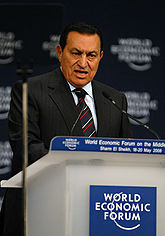Change At The Top

David Sanger and Helene Cooper explain the Obama administration's thinking in not directly calling for Hosni Mubarak to resign:
President Obama's decision to stop short, at least for now, of calling for Hosni Mubarak's resignation was driven by the administration's concern that it could lose all leverage over the Egyptian president, and because it feared creating a power vacuum inside the country, according to administration officials involved in the debate.
In recounting Saturday's deliberations, they said Mr. Obama was acutely conscious of avoiding any perception that the United States was once again quietly engineering the ouster of a major Middle East leader.
I hesitate to say much of anything about this because, again, what the heck do I know about Egypt. But given that the country is scheduled to have a presidential election in 2012, the terms of that vote rather than the disposition of Mubarak right now seem to me to be the key issue. Obviously, Egypt's presidential elections are shams. Appointing a new president for 18 months and then holding a new sham election doesn't do much good. What's really needed is concessions around the electoral process to give opposition candidates a fair chance.


Matthew Yglesias's Blog
- Matthew Yglesias's profile
- 72 followers



